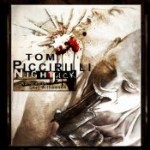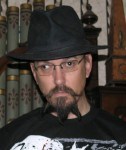
He has over 150 short stories published in anthologies, magazines, and five collections, the most recent of which were Defining Moments published in 2007 by WFC Award winning Sarob Press, and the currently available Ennui & Other States of Madness, from Dark Regions Press. His work has appeared in and is due out in various anthologies and magazines. David lives and loves with Patricia Lee Macomber in the historic William R. White House in Hertford, NC with their children, Billy, Zach, Zane, and Katie, and occasionally their genius college daughter Stephanie.
And in his spare time, he runs Crossroad Press.
HN: Tell us about the origins of Crossroad Press.
DNW: I’ll give you the shorter version on this particular question, because I think it’s the one I’ve answered most often. I never started out to be a publisher. Like most authors, seeing the digital revolution taking place all around me, I wanted to find a way to reach new readers and get my older books back into circulation. I did my homework and started to learn how to format, and publish eBooks. This would be nearly three years ago, possibly longer. I’m starting to lose track.
Once I really got it figured it out, a couple of friends wondered if I might not do the same thing for them. I quickly realized two things. If I started helping everyone else it was going to eat up a lot of time, and I could not do it for free. That was the first. The second was that, if I was going to publish, it was going to be different. I would not price things too high. I would not take most of the money and leave the authors wondering what hit them. I’ve been writing for a very long time. I’ve dealt with publishers and agents on most levels in my career, and almost all of that has – at least in some way – left a bad taste in my mouth. I sorted out the things that tasted the worst, and found ways to fix them.
Things have changed drastically in a few short years, as is the way with technical revolution. The old rules – the things that bound creative minds to old-school publishing models, reading fees, incredible wait times and bondage (in particular to groups of people that in theory work FOR an author, not the other way around – like agents) are no longer viable in the same ways they used to be. There was room, in other words, for something different, and that is what Crossroad Press became.
Since inception, we’ve grown to carry titles by around a hundred different authors, and have over five hundred available titles. This number grows faster than we can keep track of, at times, and our backlog (which we work as fast as humanly possible) increases – very literally – on a daily basis. One of our hardest battles at this point is NOT to become a publisher where people have to wait and wait and wait like they did under the older publishing models. Thankfully, I work with a very talented team, and it also grows daily. The core of the company, myself, David Dodd, and the love of my life, Patricia Macomber, spend countless hours formatting, proofing, publishing, promoting – Jeffrey Kafer, a world-class narrator in his own right, and sound engineer, masters our audio and keeps me from making too many stupid mistakes in that realm – and behind the scenes (paid low wages, free books and profuse thanks) there is large group of others – proofreaders, copy-editors, and even narrators taking a chance on some of our books on royalty share terms – sharing the risk, and hopefully the success – that this brings. It’s a brave new world.
We have a sort of unspoken policy that we strive to live up to. Crossroad Press is an asshat free company. We do not argue with authors over their rights. We try to communicate regularly and swiftly. We work with authors to make the final product what they want it to be, and do everything in our power to help make that product a success. We help others when we can. We are not greedy. I think that about covers the Crossroad Press creation story … slightly modified.
HN: Have your goals with Crossroad changed since its inception?
DNW: As with most things, our goals have changed by degrees. My initial goal, like I said, was just to get my work out there. My next goal became helping some friends do the same thing. My current goal?
I don’t think we’ll ever take over any huge chunk of the industry (though I could be wrong – evidence to the contrary actually exists). I do think that we will become a model, and an example, of how things should – and will – work in the future. I can’t tell you how sickened I’ve been by the scuttling of publishers, agents, publicists, and people who have nothing really to do with publishing at all – rushing to take advantage of authors, eBooks, the new markets, all in the hope of snagging a bunch of money for themselves, and with about the same regard for authors and their work as the old guard had – very little. I will say this again. A publisher does NOT CHARGE THE AUTHOR – a publisher PAYS the author – and an agent who would recommend an author pay hundreds of dollars to get a book converted to digital is getting a cut of that money and does not care one whit about the fact the author will never make any money.
We’d like to set a standard where the author comes first. In a digital world, the old claims of huge costs and warehousing and shipping – all of that is falling away. POD is clearing the way for more efficient delivery and ordering of print books. eBooks and audiobooks are making more and more of the words and stories available with no shipping or handling at all – beyond the initial publication of the work.
A lot of authors are learning to publish their own work, and doing a fine job of it. Others don’t have the skills, or the time – and what we have done is to create a publishing company that will help those people, while not robbing them blind. It’s pretty simply the right way to do business.
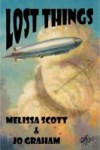
HN: If you could change anything about Crossroad Press what would it be?
DNW: That’s a hard question. There are things I wish were different, but I’m not sure what you’d change about the company itself to fix them. I’d like Crossroad Press to be more visible. There is a misconception in a lot of places that we are like a lot of other “services” – charging people to publish their books. We have never charged any author for anything. We are a publisher. We PAY authors. I’d like to have stronger connections to the big retailers like Amazon.com – but they seem intent on swallowing everything up, and are probably not too happy with us currently as several folks have refused offers from them to bring their work our way instead. I wish we had a big advertising budget, and I wish we had a couple more Adobe InDesign folks who could do book interiors, but since our overhead is very low – I probably mentioned we give most of the money to the authors – we pay in percentages. Those who work with us, grow with us, and it’s a little harder to find the right people (though very rewarding to work with them when we do).
Overall, I’m very pleased with the way the company has grown and progressed. It’s been slow, steady, and that seems to have kept us afloat as other ventures rise and fall in almost meteoric flashes.
HN: Publishing and writing are two very different beasts. Do you prefer one over the other?
DNW: Writing is, and always has been, a pretty solitary thing. I love to write. I love to create. No matter what else I’m doing, somewhere in my mind, I’m thinking about writing. I am first and foremost, an author. I almost feel as if I’ve been drawn to the publishing by a void that needed filling, rather than a real desire to become a publisher.
That said, I have grown closer to a lot of people I’ve known for years, and met a lot of folks I only dreamed of being friends with before. I’ve worked with legends, and future legends – I’ve read hundreds of books I might have missed out on – and I’ve learned a lot that will help me in my own work from working with the words of others.
If I had to give up one or the other, it would be publishing, because I simply can’t imagine a world in which I did not write. At this point in my life, though, I love them both. I’m fortunate enough not to have to do the publishing alone, and to work with people who understand things like my taking off most of November to write a novel every year, or when I get suddenly caught up in something and can’t pull away from it until it’s done.
I hope – at some point – to see that Crossroad Press has helped drive sales of my own work, as well as that of others, because at that point I’ll have reached my original goal, albeit by a very interesting and circuitous path.
HN: How much marketing do you do these days in comparison to writing?
DNW: I hate marketing. I have learned things about it, though, and try to funnel my energy into things that actually work, and steer people away from what does not. What most authors call marketing I call a waste of time. Going onto Facebook, for instance, and splashing your book onto the timelines of your friends over and over, or tweeting about it to your list? Waste of time. Almost no sales are generated beyond the very first time you mention something, and it really gets irritating for people on Facebook. Events? (particularly those through Facebook) They are going out to that same already saturated group of friends, and even more of a waste of time.
So, to answer your question, I spend a lot of time marketing, but what I do with that time is to search out new places to advertise, find new review sites, work toward relationships with online retailers that will get front-line visibility for titles and authors – in other words – work toward expanding our visibility and readership rather than pummeling those who already know we are there.
The sad thing is that, even as the paradigms shift, the money still rests in the hands of a few big companies. When you view the front page of any big online store, you see the same names and same publishers as always … and a few newcomers clawing their way into the light. We are clawing … still kind of dark, but we have hope.
HN: What’s your take on the horror genre? Healthy and growing? Worn down and struggling?
DNW: I never know how to approach this question. First off, the notion that there IS a horror genre is hard to really sustain. So many things fall under that umbrella, and so many people try to define what is, and is not a part of it, that it’s nebulous and impossible to nail down. There are fandoms for each sub-genre, bitter arguments over others – like dark fantasy – being included. How someone can say a dark fantasy novel about Elric and a sword that sucks souls is too fantasy, but not see dead bodies rising to eat brains as ALSO being fantasy? It’s all fantasy – that’s what people seem to miss.
Dark fiction has always existed. Before people said it was horror, authors were writing about ghosts, vampires, monsters – both human and otherwise – and the things that scare them. Books addressing those things – fears, chills, the unknown and the supernatural – will never go out of style. They become redefined on a regular basis, but who really determines genres? Marketing people do that. Sales people do that. Publishers (sometimes) do that. The very fact that we cut our fiction into slices has become a problem because – once you are spread over a particular slice, that’s what publisher’s expect from you going forward. There are fabulous tales of authors trying to break out of their particular genre – and failing – or succeeding only because they are so wildly popular that they force publishers to take one if they want to get the other.
This is a barrier we are breaking down at Crossroad Press, I’d point out. We are finding that many of the authors we work with have books that agents and publishers could not pigeon hole, and so, were never published. We love books like this. Lost Things – mentioned above – is such a book. Fantasy, magic, history, thriller? What difference does it make? It’s a story.
For a very long time horror has been mired in a very few subjects, zombies, vampires, serial killers – and at the same time authors outside those boundaries have written things easily as horrific – and had greater success? Why? Because the problem with a pigeon hole is that only a few people at a time can look into it. I hate the idea of genres, though I understand that shelving things by subject matter is important. I hate the idea that I might be considered a sci-fi author, or a horror author, or a fantasy author and that the mysteries, thrillers, etc. I write could suffer because of it. I’m a writer – most authors I know write a variety of things, and would write BETTER stories if left alone to do so, rather than pestered and prodded back toward things they’ve already explored.
Horror, then, is fine, has been fine, and probably always will be. What people usually moan about is not the death of horror, but the death of some segment of publishing that they loved. The glut in the ’80s, for instance. When publishers stopped saturating the shelves with mediocre crap a dozen titles at a time, people said horror is dead. The reality is that the crowd moved on, and the volume of schlocky titles dropped. It happens in all “genres” but it’s a marketing shift, not a shift in the taste of readers.
Another discovery I’ve made as a publisher is that a lot of books were mislabeled with horrible covers and blurbs that had little or nothing to do with what was between those covers. Who did that serve, do you suppose? Not the authors.
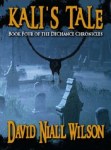
DNW: This is not a current trend, it’s always been the case, with the exception of the top-level authors who could sell their laundry lists. Even at that level, Koontz has been doing Odd books forever now, and had several other “grouped” works, King has written a lot of novels in the same odd little universe and tied a lot of it into his Dark Tower novels, Anne Rice wrote about a single character, and it’s also true of the top ranking books in mystery, thriller, etc. Series books have always had a bigger appeal, and the reason is simply that people who really enjoy a book always feel that little “let-down” when it’s over. With a series, the let-down comes with the hope of another story – familiar faces – characters you can invest in long-term without having that investment sundered by the simple words – The End.
One thing I’ve noticed with my own Donovan DeChance series and the O.C.L.T. and Scattered Earth series we’re publishing at Crossroad Press is that they feed backward. You do the first book, usually not much fanfare. Book Two comes along, some folks read it, and realize they need Book I to have the full picture, and it goes on like this. Often when we manage to get a bigger promotion, like a “Nook First” slot at Barnes & Noble, we plug in a later book in a series, because it spurs readers to take the deal, and then they rush back to buy the other books in the series. It’s sustained entertainment. You can buy a single, stand-alone book and hope that it entertains you – or you can buy a book with characters you already know, dip back into familiar fantasy worlds and the lives and adventures of characters you are already invested in and already understand, to a point.
Hard to say if this is an extension of television series shows, or if they are just both part of the same sort mindset. Fandom is something we all seem to enjoy on one level or another, whether it’s a love of the work of a particular hard-nosed detective, or a desire to watch aging teenagers kick vampire booty – it brings people together.
So, while I love a good stand-alone novel, I have my guilty pleasures. I love the Dresden Files novels, for instance, and have followed several thriller and mystery characters through hours and hours of audiobooks. Even in movies, if something is successful, the first thought Hollywood has is – SEQUEL. The familiar is an easier sell.
So … I hope everyone will go out and fall in love with Donovan DeChance, or the crews of the Dread Remora, or the Airship Vector in our Scattered Earth series. Dive into the O.C.L.T. and find everything from physics to ancient Egyptian magic.
As an author, I like writing series projects because it’s sometimes the way my mind works. Things occur to me, and I find myself looking at them through the perspective of one of my characters. In any case, I don’t think the popularity of the series as opposed to the stand-alone novel is any more prevalent now than it has been in the past … we have always loved a continuing story.
HN: Do you write for yourself or your readers?
DNW: I had to laugh when I read that. The simple answer, of course, is yes. If either answer was not true, I’d not write at all. Despite declarations of writing for their own pleasure, or for their “art” I have never met an author that I believe was not concerned with the reaction of others to their work. I write because I have stories to tell – but if I did not intend to tell them to others, it would be a pointless exercise. Sometimes, when I wait weeks, even months for a reaction to the work – it feels that way.
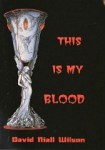
Now the game has changed. I really and truly believe that the quality of work from the authors who move away from the traditional and into more independent, or Crossroad Press style environments, will improve significantly. Our rules on what we do, and do not publish, are pretty simple.
With few exceptions, we publish authors with proven track records, and a back-list of books they want to move into digital channels. Sadly (and simply) we do not have the staff or resources to run an open submission publishing model, so we won’t. Maybe at some future date.
Anyway, from that group of established talent, we publish what they give us. I don’t tell an author, that’s great, but could you give us something like your last book? If the author in question is an established professional, and they are invested in a book they’ve written, we publish it. We copy-edit, we proofread, we format, we work with them to create the cover art and market, but we do not presume to tell them what they should, or should not be writing.
I’m hoping to establish some more “series” type works, like Mysteries at the Crossroad, and we are also doing some children’s books. There is no genre we’re not interested in, and we are here to support people writing what they WANT to write. Writing, in other words, for themselves AND for readers. I expect that to prove a win/win sort of policy. So far – so good.
HN: What are you currently working on?
DNW: Several things at once, as is my habit. I am a little more than halfway done novelizing my screenplay, Killer Green (which I still hope to see on the big screen one day). I have started Nevermore, the fifth book in the Chronicles of Donovan DeChance – which will (among other things) offer a fictionalized version of the writing of “The Raven,” by Poe – based on a local rumor that it was first penned at a place situated on the border of North Carolina and Virginia. I have a new Cletus J. Diggs story underway, and a novella continuing the adventures of the characters I created in my Scattered Earth novel, The Second Veil. Always keeping busy. I have also started a series of Dr. Seussish books with my daughter, the next of which will be The Skeleton Inside Me Doesn’t Scare Me.
HN: Anything else you’d like to add?
DNW: Just a quick plug for some upcoming things, and some others we are doing to “pay forward” a bit. You can never be too generous donating to the Karma bank.
Watch for the Orangefield Cycle books by Al Sarrantonio – coming VERY soon.
We will not only be publishing G. Wayne Miller’s classic “Thunder Rise,” but two unpublished sequels.
We have just released two titles that are paying a portion of their revenue to charity. The first is a book I wrote with my daughter, Katie – Perilous Pink PcGee – available in all digital format and as a very short audiobook download from Audible.com. Katie is donating a portion of her earnings to the International Child Art Foundation.
The second is The Work of Human Hands – Revised Edition by G. Wayne Miller. This is the story of famed surgeon Hardy Hendren and the child he operated on – as well as a wonderful peek behind the scenes at the Children’s Hospital in Boston. Hardy has started a new foundation and we are donating a portion of sales to that worthy cause. This book will be out in hardcover and trade paperback by Christmas, and is available now in digital formats. Work is underway to get it into audio.
